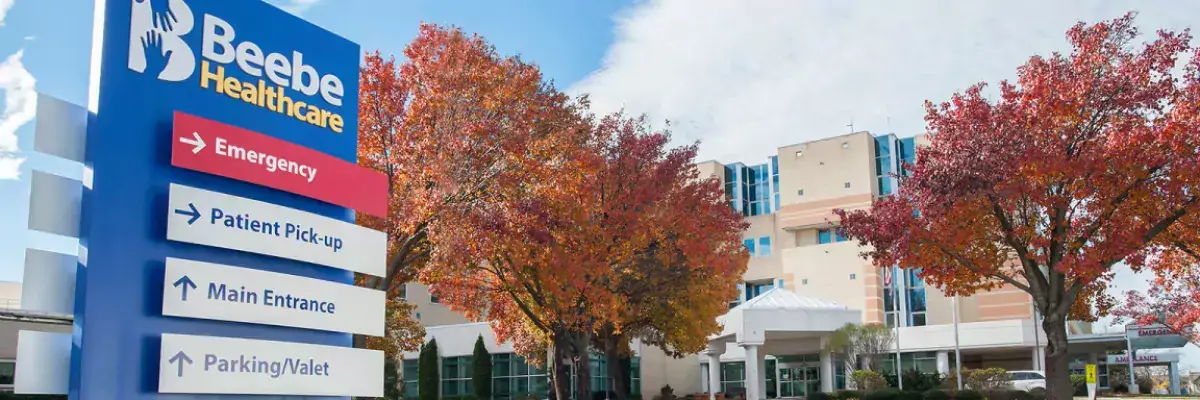Embrace the Pivot: How COVIDS-19 Teaches Us to Be Flexible

ENJOY THE WAIT
Doctors and married couple Ala Alkhatib, MD, of Beebe Pulmonary Associates, and Joanna Khatib, MD, of Beebe Endocrinology, were completing fellowship training in New Orleans when the pandemic shut everything down.
“After three years, we were looking forward to moving into our new careers,” recalls Dr. Alkhatib with a smile. “Then the pandemic hit, and even though I was done with my ICU rotation, we got pulled back in because they needed as much help as they could get.”
“Everything was closed and then slowly, needed services began to open back up,” Dr. Khatib said. “Even though it was a crazy time, we were lucky because we knew that we would be joining Beebe Healthcare.”
One thing the doctors both took away from this experience: it is OK to wait.
“It’s normal to feel frustrated once in a while, but if we allow ourselves to stay in that heightened state of frustration or fear, it can harm our health,” says Kim Blanch, RN, of Beebe Community Health.
“For some people, the pandemic may have pushed them into a constant fight or flight mode, releasing more cortisol – the stress hormone. Over time, this can have negative effects on our physical, mental, and emotional health.”
As a society, we’re used to expecting (and receiving) instant gratification. When we don’t get this, we can quickly become frustrated, impatient, and even angry. By allowing ourselves to be open to waiting, we can relax and breathe more deeply, which allows us to stem those feelings and limit their negative impact on our health.
FIND HEALTHY DISTRACTIONS
People may have felt stuck inside more than normal, and as time dragged on, many began to turn to more comfort foods and less exercise. “The pandemic is not the reason we gained weight,” notes Dr. Khatib. “We gained weight because we were less active and maybe because we craved comfort, and that often comes in the form of food.”
Dr. Alkhatib and Dr. Khatib – who moved to Lewes last summer – found they needed a distraction from all the news, and they chose to focus on their health. “We are lucky here that it is safe to go outdoors and there are many trails and nature preserves to enjoy,” says Dr. Khatib. “With a little planning, you can add to your daily steps quickly just by walking and exploring your area.”
You might consider creating a home gym. Instead of shelling out thousands on a Peloton or whole-body system, you can start small with items that won’t break the bank, including an inflatable balance ball, resistance bands, free weights – start with smaller weights – and a yoga mat. There are many exercise routines available on free services, such as YouTube, and other apps are available for a fee.
REBUILD & REINVIGORATE
As the pandemic is hopefully drawing to a close, now is the time to work on your vision for the future. The pandemic has taught us the importance of how we spend our time.
“It might take you months or even a year to start to feel like normal,” Dr. Khatib says. “I think in the future when you walk into a store without a mask or sit indoors at a restaurant, you will remember the pandemic and when we couldn’t do those things.”
If you felt like you had no energy during the pandemic, it was likely stress-related, shares Dr. Khatib. Now is a good time to reflect and start to let go of the stress from this past year.
“By increasing our self-awareness, we’re better equipped to identify when our stress levels are rising and when to push pause. A few simple, deep belly breaths can offer relief and stop the spiraling thoughts. If you are feeling depressed or are in need of help, please talk to someone. You can talk to your doctor, a close friend, or call 211 in Delaware to find support resources,” Kim said.
Dr. Alkhatib agreed. “If you are stressed, you may feel tired and want to sleep all the time, or even eat more food. This can become a vicious cycle that leaves you with even less energy to make healthy choices. We are here to support you. Be sure to reach out to someone for help.”
Create Your Post-Pandemic Vision
SET GOALS: Write a list of goals or activities that you want to do over this year or even create a bucket list for the next 10 years.
CREATE A VISION BOARD: Gather magazines, scissors, glue, and card stock. Cut out images or words that inspire you and glue them onto the cardstock.
CREATE YOUR IDEAL DAY: Sketch out what a good day looks like to you - and then create a regimen that will boost your motivation and keep you on track.
SET A DATE: Make plans to get together this summer - either in-person or over a video chat. Catch up, laugh, and reconnect. Talk about the future with friends and family.
HONOR A MEMORY: If you lost a loved one during the pandemic, focus on ways you can honor their legacy, visit their gravestone, plant a tree, or create a garden.


